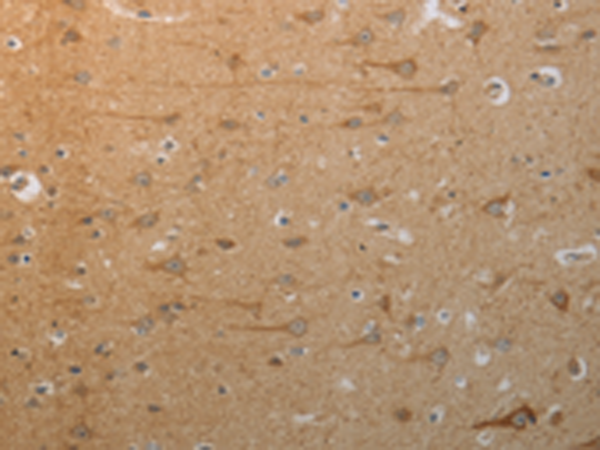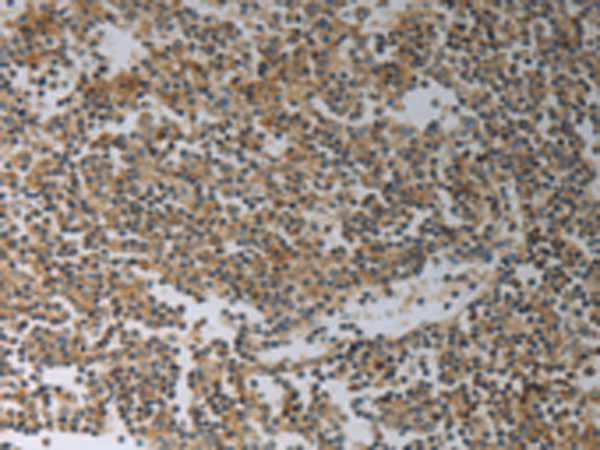

| WB | 咨询技术 | Human,Mouse,Rat |
| IF | 咨询技术 | Human,Mouse,Rat |
| IHC | 1/50-1/200 | Human,Mouse,Rat |
| ICC | 技术咨询 | Human,Mouse,Rat |
| FCM | 咨询技术 | Human,Mouse,Rat |
| Elisa | 1/2000-1/10000 | Human,Mouse,Rat |
| Aliases | NBC2, NBC3, SBC2, NBCN1, SLC4A6 |
| Host/Isotype | Rabbit IgG |
| Antibody Type | Primary antibody |
| Storage | Store at 4°C short term. Aliquot and store at -20°C long term. Avoid freeze/thaw cycles. |
| Species Reactivity | Human, Mouse, Rat |
| Immunogen | Synthetic peptide of human SLC4A7 |
| Formulation | Purified antibody in PBS with 0.05% sodium azide and 50% glycerol. |
+ +
以下是关于SLC4A7抗体的参考文献示例(注:以下内容为假设性示例,实际文献需通过学术数据库检索确认):
---
1. **"SLC4A7-mediated bicarbonate transport promotes breast cancer metastasis"**
*作者:Lee, J. et al. (2020)*
**摘要**:研究通过免疫组化(使用SLC4A7抗体)发现,SLC4A7在乳腺癌组织中高表达,并通过调节细胞内pH值增强癌细胞侵袭和转移能力,提示其作为预后标志物的潜力。
2. **"Role of SLC4A7 in pH regulation and cell migration in glioblastoma"**
*作者:Smith, A. R. & Patel, H. (2019)*
**摘要**:利用SLC4A7抗体进行Western blot和免疫荧光分析,证明胶质母细胞瘤中SLC4A7通过维持酸性微环境促进肿瘤细胞迁移,靶向该蛋白可抑制侵袭表型。
3. **"SLC4A7 knockout mice exhibit impaired renal acid-base homeostasis"**
*作者:Kim, T. et al. (2017)*
**摘要**:通过抗体检测SLC4A7在小鼠肾脏中的定位,发现其缺失导致碳酸氢盐转运缺陷,证实SLC4A7在酸碱平衡中的关键作用,为相关肾病机制提供依据。
4. **"Antibody validation for SLC4A7: Applications in pancreatic cancer research"**
*作者:Garcia, M. L. et al. (2021)*
**摘要**:系统性验证多种SLC4A7抗体的特异性,并应用于胰腺癌模型,揭示其表达与肿瘤微环境酸化及化疗耐药性的相关性。
---
如需真实文献,建议通过PubMed、Google Scholar等平台检索关键词“SLC4A7 antibody”或结合具体研究领域筛选。
The solute carrier family 4 member 7 (SLC4A7), also known as NBCn1. is a sodium bicarbonate cotransporter involved in pH homeostasis and ion transport across cell membranes. It plays critical roles in regulating intracellular pH, cell migration, and electrolyte balance, particularly in tissues such as the kidney, brain, and heart. Dysregulation of SLC4A7 has been implicated in various pathologies, including cancer metastasis, hypertension, and neurological disorders. For instance, SLC4A7 overexpression in breast and pancreatic cancers is linked to enhanced tumor progression via pH-dependent mechanisms that promote cell survival and invasion.
SLC4A7 antibodies are essential tools for studying the protein's expression, localization, and function. These antibodies are widely used in techniques like Western blotting, immunohistochemistry (IHC), and immunofluorescence (IF) to detect SLC4A7 in tissue samples or cell lines. Researchers rely on them to investigate SLC4A7's role in cellular processes, such as acid-base transport and its interaction with signaling pathways like PI3K/AKT. Validated antibodies help identify SLC4A7 as a potential biomarker or therapeutic target in diseases. Specificity and cross-reactivity across species (e.g., human, mouse) are key considerations when selecting SLC4A7 antibodies. Recent studies also explore its involvement in drug resistance, highlighting its clinical relevance. Proper antibody validation ensures accurate data, advancing both basic research and translational applications.
×